Beste,
Some of you may have noticed that – to put it mildly – I haven’t written a ton of articles lately. The reason why is a thorny problem that journalist and author Geert Mak once called “the great accidental conspiracy.”
It goes like this: you write something that people take a reasonable liking to, and then you’re invited to yak about it so much that you no longer have time to write, read, or do any thinking in general. I believe I’ve fallen prey to it. My book Utopia for Realists (original Dutch title Gratis geld voor iedereen) is now being published in twenty countries. It’s overwhelming to see how much interest there is in the ideas I’ve had the fortune to write about for the last several years at De Correspondent.
But the cardinal reason for my non-productivity in recent months can be summed up in three letters: TED. Last year, on October 31 to be exact, I received an email from Kelly Stoetzel, content director at TED.
Invitation to speak at TED 2017, read the subject line.
I had an instant heart attack.
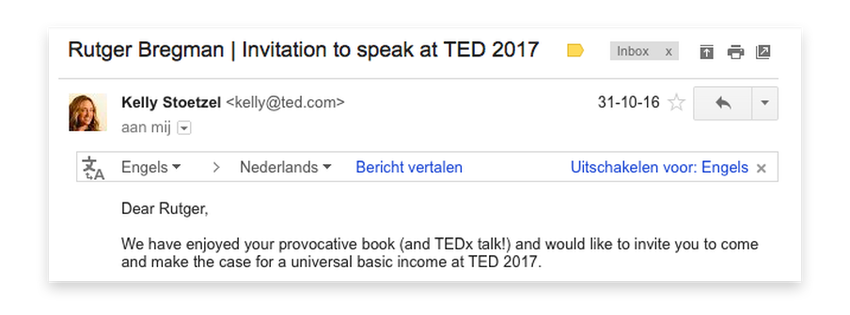
The TED phenomenon
I probably don’t need to explain what a TED talk is at this point: a short speech of at most 18 minutes, in English, preferably delivered with panache. Twenty years or so ago, TED was still a Silicon Valley event about Technology, Entertainment, and Design. The intended audience: rich folks of a certain maturity.
Some things have stayed the same – it’s still an event for rich folks of a certain maturity (a ticket can cost you – you might want to sit down for this – $10,000). But these days, TED is a global phenomenon.
The turning point came in 2006, when TED put its videos online. The rise of TEDx helped, too. TEDx is a kind of franchise: anyone can organize a TED event these days (provided they have a license, which is granted upon meeting the requirements posed by TED’s grand pooh-bahs).
There are now more than 1,500 TEDx events in 130 countries every year. Three years ago, I’d had the privilege of giving a TEDx talk at possibly the best TEDx in the Netherlands (TEDx Maastricht) – but now I was being invited to speak at the main TED conference in Vancouver, Canada. The big one.
To give you an idea: this year’s speakers included Serena Williams, Elon Musk, and the pope. In the audience each year are notables such as Bill Gates, Monica Lewinsky, Steven Spielberg, Richard Branson. People who want to grace the guest list not only have to lay down ten grand, but also must make it past a jury. See, your resume has to be compelling enough (most of the people roaming the floor are CEOs at I-can’t-even-tell-you-what-a-big-deal companies and organizations).
Thus my instant heart attack. I don’t believe I’ve ever read an email with such mixed feelings before. Two thoughts careened through my brain: YES YES YESSSSSSS! But also, and mostly: OH NO NOOOOOOOOO!
“The Mount Everest of public speaking”
There are few things that strike greater terror into the Homo sapiens heart than public speaking. I’ve given my fair share of talks in recent years, but to be honest, I’ve never gotten used to it. My nerves still get me every time.
Luckily there was a special workshop addressing just this problem at the start of the conference, titled “Managing Backstage Jitters.” TED’s fantastic speaker coach, Gina Barnett, kicked things off with the observation that TED is “the Mount Everest of public speaking.” At which point I promptly choked on my cold-pressed carrot juice. (Thankfully, the workshop got much better from there.)
When you watch a TED talk that flows well, you might think it’s the kind of thing that doesn’t take too much time to prepare for. But what’s true for the written word is just as true here: the more natural it seems, the more blood, sweat, and tears it took to get there.
I started writing my talk six months in advance. What followed was an endless process of revising, testing, and practicing during which I leaned heavily on the help of our translations editor, Erica Moore; illustrator Leon Postma (who made the gorgeous presentation for me); Floor Milar, who runs our speakers agency; TEDx Maastricht organizers Gonny Willems and Jean-Paul Toonen; speaker coach Annette Schutte (three thumbs up!); and of course the people at TED itself (in particular Chris Anderson, TED’s head honcho) who cast a critical eye on my script and made me practice my talk for them (via Skype). In the end, most of my time was spent memorizing my speech.
Right now you’re probably thinking: huh, what? Memorizing it? Won’t that make you sound like a robot?
The answer is: yes, memorizing a speech is generally a terrible idea. Unless you memorize it incredibly well. A good rule of thumb is that you should be able to rattle it off three times as fast as usual. That means you know it so well you’ll be able to pay maximum attention to the things that make your talk seem natural: your pronunciation, body language, and so on.
Almost everyone at TED prepares for their talk this way (and – at least to me – you can easily tell who hasn’t: those are often the more ho-hum talks).
What not to do: start practicing too early
The only thing you absolutely shouldn’t do is memorize your talk too soon. If you want to make changes later, you’ll have different versions swimming around your head. And – you guessed it – yours truly memorized his talk waaaaaaaaay too early. In January, to be precise.
For what it’s worth, I do have an excuse. Most people experience deadline stress – that is, most people start feeling more pressure as the deadline draws nearer. I have just the opposite. The minute Kelly Stoetzel’s message arrived, I wanted to write out my TED talk and commit it to memory pronto. (People usually look at me funny when I tell them this, but that’s really how it works. In his TED talk, psychologist Adam Grant confessed that he suffers from the same syndrome, and since then I haven’t felt so alone.)
Once I arrived in Vancouver, I was able to practice on the main stage. Here’s what it looks like:
Photo by Ryan Lash/TED

The room seats about 1,200 people, but it actually feels pretty relaxed. It was designed as a kind of living room that doesn’t realize it’s actually an arena.
There are really two conferences: the one before your talk and the one after
For me, the worst thing about appearances like these is the endless waiting, waiting, waiting. Take roughly the day beforehand, for example – what you’d really like is to bolt down a pill and sleep until fifteen minutes before you go on. The people at TED constantly refer to “the pre-talk conference” and “the post-talk conference.”
In the pre-talk phase, you’re so crazy you don’t know what to do with yourself. I spent most of my time sprawled on the bed in my hotel room. In the post-talk phase, on the other hand, you can spend your time schmoozing with all those rich folks. And eating expensive seaweed crackers. (Confession time: I hate schmoozing and the seaweed crackers were gross, so in the post-talk phase I spent most of my time sprawled on the bed, too.)
At last the day arrived: Tuesday, April 25. I was slated to talk at 11 AM – nice and early, thank the gods. And luckily I still had the tips the speaker coach, Gina Barnett, had given us:
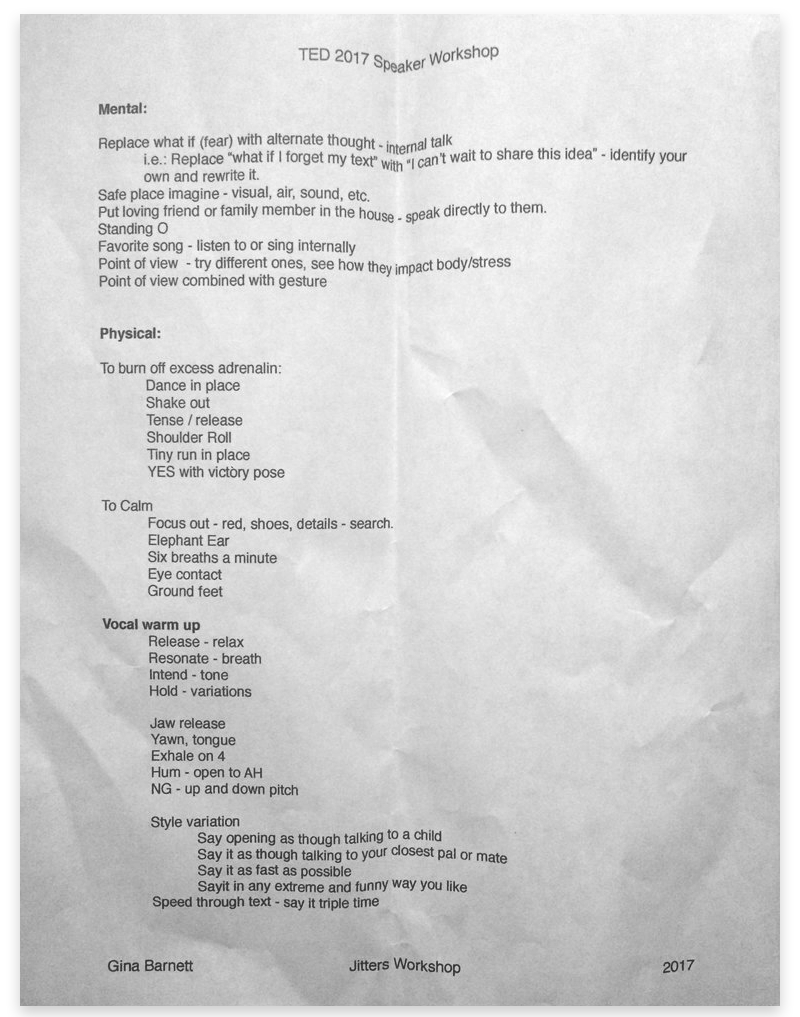
How do you keep your nerves in check?
When people ask me now for my advice on calming your nerves, I offer these two, somewhat contradictory, tips:
1. Think about the idea you want to share, not about yourself. It isn’t about you; it’s about what you have to say. Besides, the TED audience is friendly and very interested in that riveting idea of yours.
2. Talk yourself up, not down. You’re massive, fantastic, amazing. You absolutely know infinitely more about the topic than those nitwits in the audience.
That last tip may sound a little self-helpy, but it works – at least for me. As soon as a sliver of self-doubt creeps in (and believe me, it’s lurking everywhere), start emphatically telling yourself that you’re totally pumped to be doing this, you’re going to do a fantastic job, you know your stuff inside out and upside down, you’re going to blow them all away, and so on, and so forth. The trick is to not leave an iota of room for your brain to think even the tiniest negative thought.
It’s not advice I’d recommend for the rest of your life, by the way – it’d probably turn you into an insufferable jerk. But in times of great stress and self-doubt, I think you’re allowed to bring out the big guns.
And there, at last, I stood:
Photo by Bret Hartman/TED
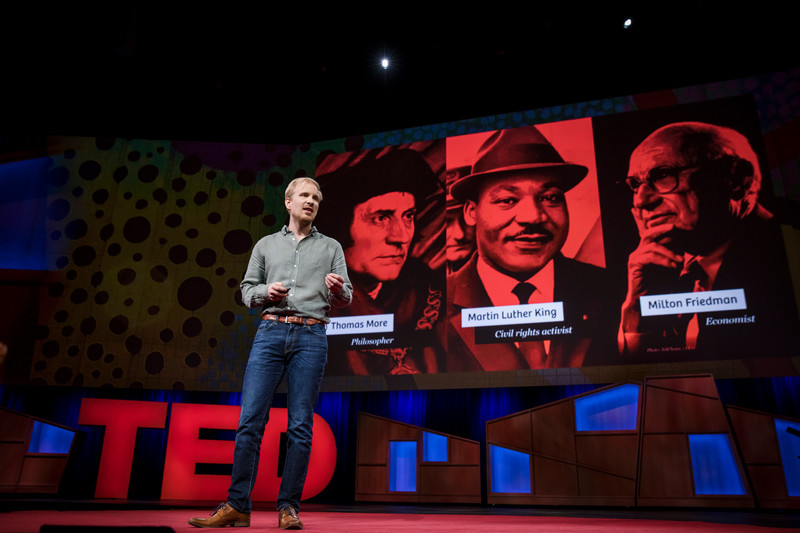
And it went well!


And there was that blissful post-talk conference. I finally had time to take a good look around. Nibble a few seaweed crackers. Do a little verbal jousting with some wealthy venture capitalist who believed the Roman Empire was felled by an excess of leftist politics (and that that was why a universal basic income wouldn’t work). And then flee to my hotel room to bang out this letter.
Greetings from (post-talk) Canada.
—Translated from Dutch by Grayson Morris and Erica Moore
More from De Correspondent:

 Poverty isn’t a lack of character. It’s a lack of cash
I got to speak at the big TED conference in Vancouver about universal basic income and the poor. Here’s my TED Talk, where I lay out why “venture capital for the people” is such a good idea. For all of us.
Poverty isn’t a lack of character. It’s a lack of cash
I got to speak at the big TED conference in Vancouver about universal basic income and the poor. Here’s my TED Talk, where I lay out why “venture capital for the people” is such a good idea. For all of us.
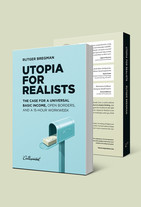 Utopia for Realists
Out now – our first book in English!
In Utopia for Realists: The Case for a Universal Basic Income, Open Borders, and a 15-hour Workweek, Rutger Bregman takes you on a journey beyond left-right divides to introduce ideas whose time has come.
Utopia for Realists
Out now – our first book in English!
In Utopia for Realists: The Case for a Universal Basic Income, Open Borders, and a 15-hour Workweek, Rutger Bregman takes you on a journey beyond left-right divides to introduce ideas whose time has come.

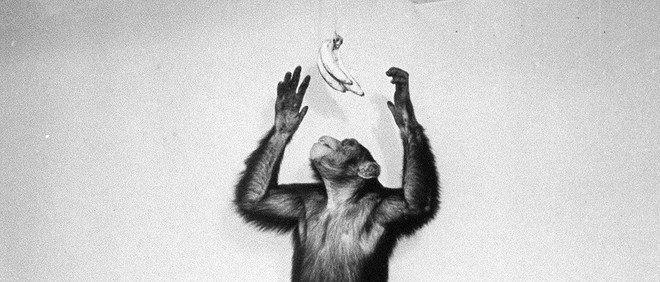 Long live intrinsic motivation. Or why it’s time to ditch the carrots and the sticks
Humans are lazy and greedy by nature, or so we tend to believe. But a new generation of psychologists and economists disagree. Their groundbreaking research paves the way for a revolution in healthcare and education and from the factory floor to the boardroom.
Long live intrinsic motivation. Or why it’s time to ditch the carrots and the sticks
Humans are lazy and greedy by nature, or so we tend to believe. But a new generation of psychologists and economists disagree. Their groundbreaking research paves the way for a revolution in healthcare and education and from the factory floor to the boardroom.
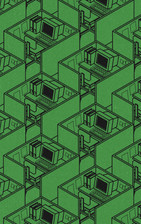
 The solution to just about everything: Working less
For more than 100 years, our workweek kept getting shorter. But since the 1980s, we’ve started working more and more. Why, exactly, is anybody’s guess, because a shorter workweek would solve nearly all the big problems of our day.
The solution to just about everything: Working less
For more than 100 years, our workweek kept getting shorter. But since the 1980s, we’ve started working more and more. Why, exactly, is anybody’s guess, because a shorter workweek would solve nearly all the big problems of our day.



